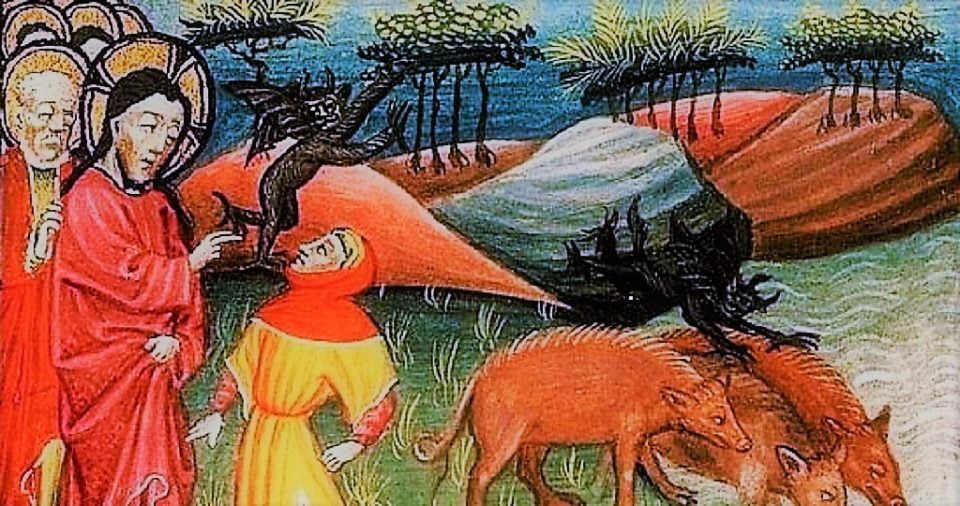The curing of the Gerasene man possessed by a demon
Mk 5:1–20

Now a large herd of swine was feeding there on the hillside. And they pleaded with him, “Send us into the swine. Let us enter them.” And he let them, and the unclean spirits came out and entered the swine. The herd of about two thousand rushed down a steep bank into the sea, where they were drowned. The swineherds ran away and reported the incident in the town and throughout the countryside. And people came out to see what had happened. (15) As they approached Jesus, they caught sight of the man who had been possessed by Legion, sitting there clothed and in his right mind. And they were seized with fear. Those who witnessed the incident explained to them what had happened to the possessed man and to the swine. Then they began to beg him to leave their district. As he was getting into the boat, the man who had been possessed pleaded to remain with him. But Jesus would not permit him but told him instead, “Go home to your family and announce to them all that the Lord in his pity has done for you.” (20) Then the man went off and began to proclaim in the Decapolis what Jesus had done for him; and all were amazed.
- vv 1-20 The inhabitants of Gerasa were mostly pagans, as one can gather from the fact that there was such a huge herd of swine there (which must have belonged to a number of different people). Jews were forbidden to raise pigs or eat pork (Lev 11:7).
- This miracle emphasizes, once more, the existence of the devil and his influence over men’s lives: if God permits it, the devil can harm not only humans but also animals. When Christ allows the demons to enter the swine, the malice of the demons becomes obvious: they are tormented at not being able to do men harm and therefore they ask Christ to let them, at least, inflict themselves on animals. This he does, in order to show that they would have the same effect on men as they have on these swine, if God did not prevent them.
- Clearly it was not Jesus’ intention to punish the owners of the swine by the loss of the herd: since they were pagans they were not subject to the precepts of the Jewish law. Rather, the death of the swine is visible proof that the demon has gone Out of the possessed man.
- Jesus permitted the loss of some material goods because these were of infinitely less value than the spiritual good involved in the cure of the possessed man.
- vv 15-20 Notice the different attitudes to Jesus Christ: the Gerasenes beg him to go away; the man freed from the devil wants to stay with him and follow him, The inhabitants of Gerasa have had our Lord near them, they have seen his divine powers, but they are very self-centred: all they can think about is the material damage they have suffered through the loss of the herd; they do not realize the marvel Jesus has worked. Christ has invited them and offered them his grace but they do not respond: they reject him. The man who has been cured wants to follow Jesus with the rest of his disciples but our Lord refuses; instead he gives him a task which shows Christ’s unlimited compassion for all men, even for those who reject him: the man is to stay in Gerasa and proclaim to the whole neighbourhood when the Lord has done for him. Perhaps they will think again and realize who he is who has visited them, and escape from the sins their greed has led them to commit. These two attitudes are to be found whenever Christ passes by — as are Jesus’ mercy and continuous offer of grace : our Lord does not want the death of the sinner but rather that he should turn from his way and live (cf. Ezek 18:23).
- v. 20 The “Decapolis” or “country of the ten cities”, among the more famous of which are Damascus, Philadelphia, Scythopolis, Gadara, Pella and Gerasa. The region was located to the east of the lake of Gennesaret and was inhabited mainly by pagans of Greek and Syrian origin. This territory came under the Roman governor of Syria.
- Leprosy, demons, all the miseries that can oppress men, all are overcome with supreme ease by Christ the Savior .
- St. Maximus the Confessor writes: “The strength of demons decreases when the observance of the commandments weakens the passions in us. It is eliminated when, by the effect of interior freedom, these passions finally disappear from the soul because they no longer find in it the complicities which serve as the basis for her attacks (Centurias sobre caridad 2, 22).”
- We are always exposed to the temptations of the devil. That is why St. Leo the Great exhorts us: “Beloved, based on the hope [of the triumph of Christ], beware of all the tricks of the devil, who not only seeks to surprise you with bodily pleasures, but also sows the harmful weeds of lie in the good wheat of faith, and tries to desecrate the field of truth, to bring down through evil mistakes those who have not been corrupted by bad deeds … Freed from these dangers by the Lord Jesus Christ, the Way, the Truth and the Life, we bear with joyful faith all the trials and skirmishes of the present life (Homily 69, 5).”